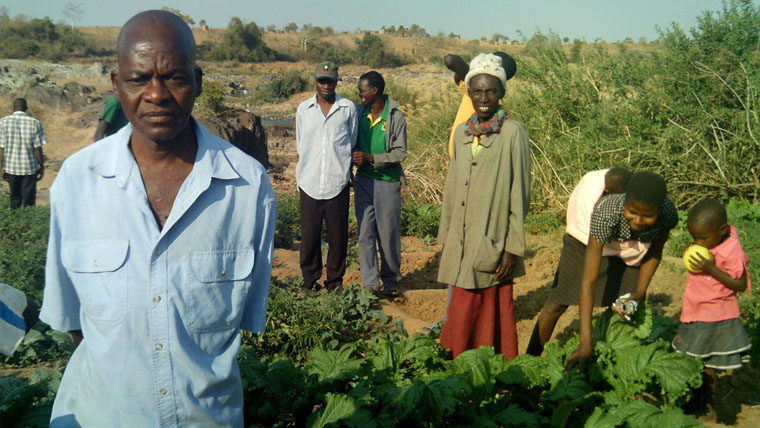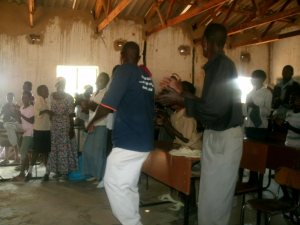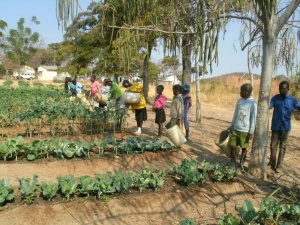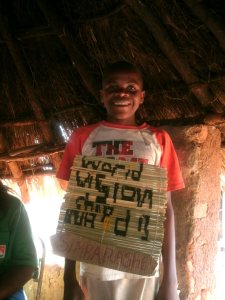Final Reflections from my Inspiring time in Zimbabwe

I don’t know if I’ll ever go back to Zimbabwe, but I’ve breathed in enough Zimbabwean dust this week that I feel Zimbabwe will never leave me! These notes don’t really do justice to such a wonderful week, but I hope they give a flavour of what my sponsor visit was like. It’s too hard to explain what it feels like to see hope in the eyes of a child, to hear success stories from people close to giving up and to know that my small amount of money each month has something to do with it.
So, we are gearing up to leave Zimbabwe but have an opportunity to see some of the work that World Vision is doing besides child sponsorship. This is exciting – I’ve already told you about meeting the beneficiaries of some goats which provide milk, meat and the ability to pay for school fees, and now I’d like to share some other remarkable ventures.
Community Milling
We went on to a project where a community have put together a group who organise milling of corn. World Vision has provided a grinding mill and the community have hired a room and a grinder and they grind maize into flour. The profits, which are made through charging for grinding other people’s maize, are being used to pay school fees for orphans and vulnerable children in the community. The community leaders were so proud of what they have been able to achieve due to World Vision that they invited other beneficiaries to come and meet with us.
 We were expecting to meet with 6 or 7 people so imagine our surprise when we walked into a room of over 100 people. They all sang for us and were pleased to stand up and say how they were being helped to look after the orphans of their communities. Some had been provided with sewing machines and were selling clothes, some had been given goats and some farming supplies and seeds. All of the people present were working to help others. We had taken a short DVD to show them how people in the UK were raising money for them, and had a small laptop to show it on. We had not expected so many people and so while Ian showed the DVD a number of times so that they could all crowd around and see it, Saul and I took the children outside and played with bubbles and balloons with them. We were ambushed!! It was a great fun time for us as children of all ages joined in and enjoyed us blowing balloons up and then letting them go while they chased after them!
We were expecting to meet with 6 or 7 people so imagine our surprise when we walked into a room of over 100 people. They all sang for us and were pleased to stand up and say how they were being helped to look after the orphans of their communities. Some had been provided with sewing machines and were selling clothes, some had been given goats and some farming supplies and seeds. All of the people present were working to help others. We had taken a short DVD to show them how people in the UK were raising money for them, and had a small laptop to show it on. We had not expected so many people and so while Ian showed the DVD a number of times so that they could all crowd around and see it, Saul and I took the children outside and played with bubbles and balloons with them. We were ambushed!! It was a great fun time for us as children of all ages joined in and enjoyed us blowing balloons up and then letting them go while they chased after them!
A Revitalised Health Clinic
6 ½ years ago we were able to visit a clinic that World Vision had helped build. The nurses’ homes were built, the waiting area, the surgery and even some houses for expectant mothers to stay in while they waited for the birth of the babies. Unfortunately it was not being used as there was a big problem with stagnant water and supplying clean water, and also problems with staffing. I had really wanted to revisit this clinic but wasn’t sure it was possible.
Imagine my delight when we drove into the clinic to see washing on the line of the nurses’ station, solar panels to provide a small amount of electricity, expectant mothers staying in the homes and nurses with patients clearly being treated! The lead nurse explained that they were finally able to open 5 years ago and it was just in time for a bad outbreak of cholera. Without the clinic, many people would not have been able to reach the next local doctor and would have died. Having this clinic was a real life saver. They currently see approximately 50 cases of malaria a week and are able to treat the sufferers who would not necessarily have been able to travel the longer distance to a different clinic. The clinic still has many needs and is overworked due to the massive area it covers and the many illnesses presented, but they are happy and grateful for the opportunity to work in this needy area.
Growing Young Gardeners
 Our last World Vision project was one that will remain in our hearts a long time. All 3 of us came away from it feeling inspired and enthused. We met a man named Retson and his family. Knowing that we were to visit, Retson had invited many of his neighbours (remember no-one lives next door, so they all had to travel some distance) so that everyone could learn something from his garden, and meet English people. A few years ago, Retson had some land on a steep hill in Northern Zimbabwe. He wanted to farm the land and so, against the advice of the local people, he began to make his hillside flat enough to farm. This is still a work in progress and will continue to be so for some time.
Our last World Vision project was one that will remain in our hearts a long time. All 3 of us came away from it feeling inspired and enthused. We met a man named Retson and his family. Knowing that we were to visit, Retson had invited many of his neighbours (remember no-one lives next door, so they all had to travel some distance) so that everyone could learn something from his garden, and meet English people. A few years ago, Retson had some land on a steep hill in Northern Zimbabwe. He wanted to farm the land and so, against the advice of the local people, he began to make his hillside flat enough to farm. This is still a work in progress and will continue to be so for some time.
He now has an amazing garden full of fruit and vegetables including: avocado, peach, pomegranate, tomatoes, beans, peas, onions, bananas and many, many more things. He explained how he set up a terraced irrigation system fed by a natural spring, how he plants so that he has natural pesticides rather than using chemicals and how he never burns anything as he uses all natural rubbish as mulch instead of fertiliser. The other local farmers were having this translated for them into Shona so that they could use the same ideas in their own gardens to make them more profitable. He is now helping about 20 orphans and vulnerable children (a vulnerable child may have only one parent or may be suffering from a physical disability) by paying their school fees from his profits.
 However, he is not satisfied to give them just the basics of what they need: food, shelter and education. He has a dream that every child should have something more in life. In order to achieve this dream, he has set aside one area in the garden that the children are in charge of. He has planted it with tomato plants and has estimated how many tomatoes should be harvested from that size area. When these tomatoes are sold, he should be able to afford to send these children on their first ever holiday. It may only be to the local town (approx. 60kms away) for one night, but as none of the children have ever been there before it will be wonderful for them.
However, he is not satisfied to give them just the basics of what they need: food, shelter and education. He has a dream that every child should have something more in life. In order to achieve this dream, he has set aside one area in the garden that the children are in charge of. He has planted it with tomato plants and has estimated how many tomatoes should be harvested from that size area. When these tomatoes are sold, he should be able to afford to send these children on their first ever holiday. It may only be to the local town (approx. 60kms away) for one night, but as none of the children have ever been there before it will be wonderful for them.
All of the other neighbours also have children to support through school and they face similar needs to Retson. The farms are being trampled by cattle due to lack of fencing and those with water are unable to keep fish as small reptiles and large birds keep stealing them. It is an easy solution for us, but so difficult for them to raise enough money to pay school fees and buy fencing – which one is most important? For them, they feel the children are! Retson explained how much of his learning and some of his set up equipment came from World Vision and how he thanked God for all the help he has received. His son is helping out in the garden so that he can learn to continue this work for many years to come. We were treated to a meal of local food at the end of this visit and enjoyed having to eat it with our fingers, which is the way they would normally eat! Great fun this once, but I do enjoy my knife and fork and clean fingers!!
I hope to be able to share more of my experience with people face to face over the coming months. A few groups of people have already expressed an interest to hear more and Ian, Saul and I will be visiting them as soon as we can. If there is more you’d like to know, please ask … and if you ever get the opportunity to visit your sponsored child … GO!
Please do ask if you have any questions about our time here in Zimbabwe. And if you’ve been inspired and would like to sponsor a child you can do it here. Thank you.